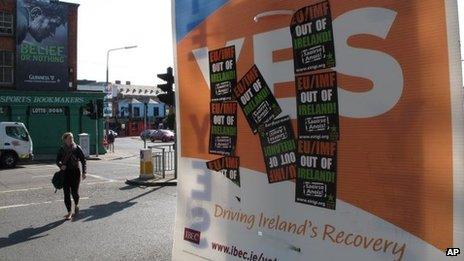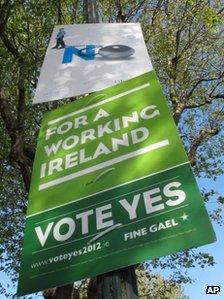Referendum voters consider EU fiscal treaty arguments
- Published

A poster supporting the EU fiscal treaty is defaced by anti-EU stickers at a crossroads in Dublin
The euphoria associated with the introduction of euro notes and coins in 2002 has long since gone.
Those countries using the currency were supposed to comply with rules about controlling their debt - few did, not even Germany.
So now eurozone states have to sign up to a new financial deal or face the consequences - including, at least for troubled Greece, a possible exit.
On Thursday, voters in the Republic of Ireland will go to the polls to decide in a referendum whether to back the European Fiscal Treaty, which would give Europe more power over the country's economy.
'Bubble'
Colm McCarthy, who lectures in economics at University College Dublin, says it would be madness for Ireland to leave the euro, but it should never have joined in the first place.
"Adoption here of a common currency sparked a classic regional banking bubble; interest rates fell and credit availability went well up," he says.
"The government didn't or couldn't do anything about it."
The fiscal treaty has been likened to managing household finances, although of course countries are different.
Just as it is unwise to spend money we don't have, states must keep the annual gap between between money raised in taxes and the money spent down to 3% of national output (GDP). The Republic of Ireland's figure is nearly three times that.
And as for long-term accumulated debt - a bit like credit card debt - it should not exceed 60% of GDP.
The Republic's is expected to peak at twice that next year, mainly as a result of paying to clean up its failed banks.
New rules
Countries are expected to obey the new rules either by raising taxes or cutting public spending, and very often both.
If they fail to do this, they face fines imposed by the European Court of Justice for endangering the currency.
Nor can states' spending in future depend on irregular taxes such as stamp duty, which the Republic relied on during its property bubble.
The Fine Gael junior finance minister, Brian Hayes, has been campaigning for a Yes vote in leafy Templeogue in south-west Dublin, but he has not been having it all his own way on the doorsteps.
He says that Ireland, with its export-dependent open economy, needs eurozone stability more than any other country.
"Being part of the eurozone has increased our trade by more than 50%, so to keep the 1.8 million people at work and create new jobs we need to be part of that zone," he says.
His coalition partners Labour and the main opposition party, Fianna Fail, also support the treaty.
Sinn Fein and the far left disagree with much of that and are urging a No vote.
Sinn Fein finance spokesman Pearse Doherty says ratifying the treaty will mean years of hardship.
"The treaty is about transferring powers from Ireland in relation to budgetary matters to the European Commission," he says.
"It enshrines the policy of austerity through a number of rules, which means austerity will be the main game in Ireland for the next number of years."

Voters go to the polls in the EU fiscal treaty referendum on Thursday
Referee
Other countries - the neighbours - will be able to monitor each others' budgets and the European Commission will act as referee.
Unless the Republic ratifies the treaty it will not get access to EU emergency loans, an insurance policy which it might well need - some say almost certainly - when it exits its current bailout loan at the end of next year.
UCD economist Colm McCarthy says Ireland faces years of austerity, no matter whether people vote Yes or No.
"The downside to voting No is that in the event that the Irish government don't get back into the bond markets next year - and I think it will be very difficult - an alternative European source of funding isn't going to be available," he says.
"To me it's a no-brainer."
With more and more taxes proposed - property and water being the latest - many people here are confused and angry about the cost of propping up the banks, which helped cause so many of the country's problems.
However, they are also fearful about the future and worried about what might happen next.
The vote could come down to the conflicting emotions of fear versus anger.
- Published2 March 2012
- Published26 May 2012
- Published25 May 2012
- Published14 May 2012
- Published2 March 2012